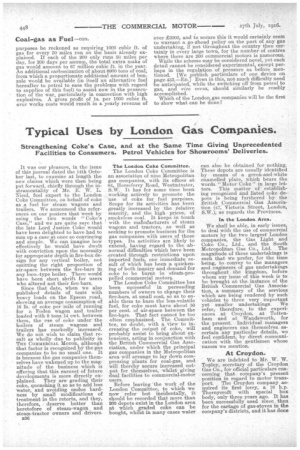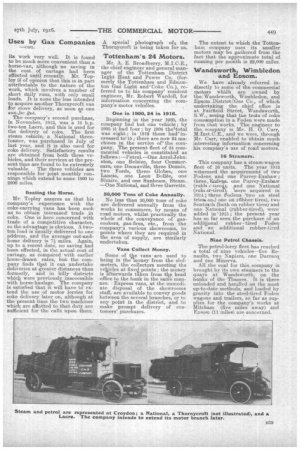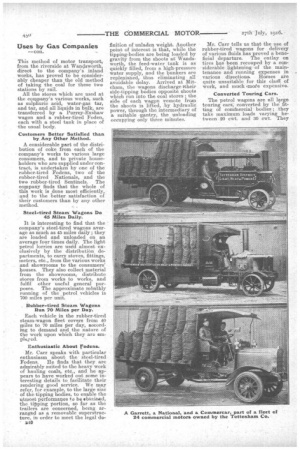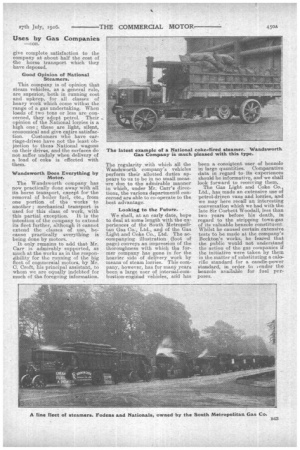Typical Uses by London Gas Companies.
Page 8

Page 9

Page 10

Page 11

If you've noticed an error in this article please click here to report it so we can fix it.
Strengthening Coke's Case, and at the Same Time Giving Unprecedented Facilities to Consumers. Petrol Vehicles for Showrooms' Deliveries.
It was our pleasure, in the issue of this journal dated the 14th October last, to examine at length the new claims which were then being put forward, chiefly through the instramentality of Mr. E. W. L. Nicol, fuel expert to the London Coke Committee, on behalf of coke as a fuel for steam wagons and trailers. We announced the references on our posters that week by using the two words "Coke's Case," and we are quite sure that the late Lord Justice Coke would have been delighted to have had to sum up a case at once so convincing and simple. We can imagine how effectively he would have dwelt with conviction upon the necessity for appropriate depth in fire-box design for any vertical boiler, not omitting the right proportion of air-space between the fire-bars in any loco.-type boiler. There would have been short shrift for users who altered not their fire-bars.
Since that date, when we also published details of tests with heavy loads on the Epsom road, showing an average consumption of 16 lb. of coke per mile of running for a Foden wagon and trailer loaded with 9 tons 14 cwt. between them, the use of coke under the boilers of steam wagons and trailers has markedly increased. We do not wish to claim that result as wholly due to publicity in THE COMMEAcIAL Monet, although that factor is recognized bY the gas companies to be no small one. It is because the gas companies themselves have wakened up to the magnitude of the business which is offering that this earnest of future developments is more directly explained. They are' grading their coke, quenching it so as to add less water, and avoiding undue hardness by small modifications of treatment in the retorts, and they, therefore, deserve better than heretofore of steam-wagon and steam-tractor owners and drivers.
B36 The London Coke Committee.
The London Coke Committee is an association of nine Metropolitan gas companies, with its offices at 84, Horsefe,rry Road, Westminster, S.W. It has for some time been working actively to promote the use of coke for fuel purposes. Scope for its activities has been greatly increased by the relative scarcitY, and the high prices, of smokeless coal. It keeps in touch I with the matufacturers of steam wagons and tractors, as well as seeking to promote business for the gas companies with users of those types. Its activities are likely to extend, having regard to the 'abnormal difficulties which have been -created through restrictions upon imported fuels, one immediate result of which has been a quickening of both inquiry and demand for coke to be burnt in stearn-propelled commercial motor, The London Coke Committee has been successful • in persuading numbers of owners to change their fire-bars, at small cost, sci as to enable them to burn the less-volatile fuel, for coke must have about 50 per cent, of air-space between the fire-bars. That fact cannot be too often emphasized. The Committee, no doubt, with a view to increasing the output Of coke, will probably assist to bring about extensions, acting in conjunction with the British Commercial Gas Association, under which the principal gas companies in the Metropolitan area will arrange to lay down compressing plants for coal-gas, andwill thereby secure increased output for themselves, whilst giving dual facilities to commercial-motor users.
Before leaving the work of the London Committee, to which we now refer but incidentally, it should be recorded that more than 20-0 depots exist in the London area at which graded coke can be bought, whilst in many eases water
can also be obtained for nothing. These depots are usually identified by means of a green-and-white enamelled plate, which bears the words "Motor Coke" in large letters. This matter of establishing recognized and listed coke depots is being furthered by the British ,Commercial Gas Association (47, Victoria Street, London, as regards the Provinces.
In the London Area.
We shall be able, iii early issues, to deal with the use of commercial motors by the two largest London companies, the Gas Light and Coke Co., Ltd., and the South Metropolitan. Gas Co., Ltd. The magnitude of these undertakings is such that we prefer, for the time being, to convey to the managers and engineers of gas undertakings throughout the kingdom, before whom our issue of this week is to be brought at the instance of the British Commercial Gas Association, a summary of the services which -are being rendered by such vehicles to three very important yet smaller undertakings. We refer, therefore' to the experiences at Croydon, at Tottenham and at Wandsworth, for the present. Individual managers and engineers can themselves ascertain any particular details, we feel confident, by direct communication with the gentlemen whose
• names we mention.
At Croydon.
We are indebted to Mr. W. W. Topley, secretary of the Croydon Gas Co., for official particulars concerning that company's present position in regard to motor transport. The Croydon company acquired its first lorry, a 16 h.p. Thornycroft with special box body, only three years ago. It has been successfully used since then for the cartage of gas-stoves in the company's districts, and it has done
its work very well. It is found to be much more convenient than a horse-van, although no saving in the cost of cartage had been effected until recently. Mr. Topley is of opinion that this is in part attributable to the nature of the work, which involves a number of short daily runs, with only small loads. It is none the less intended to acquire another Thornycroft van for stove delivery, as soon as one can %be. , gat.
The company's second purchase, in November, 1913, was a 16 h.p. two-ton Lacre, and this is used for the delivery of coke. The first steam vehicle, a National threetermer, was purchased in July of last year, and it is also used for coke delivery. Satisfactory results are obtained from both these vehicles, and their services at the present time are found to be extremely valuable. The three vehicles are responsible for joint monthly run, :sings which extend to some 1800 to 2000 miles.
Beating the Horse.
Mr. Topley assures us that his company's experience with the coke-carrying vans has been such as to obtain increased trade in coke. One is here concerned with trade of a competitive character, so the advantage is obvious. A twoton load is usually delivered to one address, and the average out-andhome delivery is 7?-; miles. Again, up to a recent date, no saving had been effected, in the actual cost of cartage, as compared with earlier horse-drawn rates, but the company finds that it can undertake deliveries at greater distances than formerly, and in hilly districts which were previously inaccessible with horse-haulage. The compa,ny is satisfied that it will have to extend the use of motor lorries for coke delivery later on, although at the present time the two machines which are alotted to that duty are sufficient for the calls -upon them.
A special photograph of s the Thornycroft is being taken for us.
Tottenham's 24 Motors.
Mr. A. E. Broadberry, M.I.C.E., the chief engineer and general manager of the Tottenham District Light Heat and Power Co. (formerly the Tottenham and Edmonton Ga,g Light and'Coke Co.), referred us to his company' resident engineer, Mr. Robert Wardell, for information concerning the company's motor vehiCles.
One in 1900, 24 in 1916.
Beginning in the year 1900, the company had but one vehicle ; by 1905 it had four ; by 1908 theTtotal was eight ; in 1912 these had" increased to'15 ; there are now 24 machines in the service of the company. The present fleet of 24 commercial vehicles is constituted as follows :—Petrol.—One Arrol-Johnston, one BeIsize, four Commerears, one Deza,uville, three Dennis, two Fords, three! Globes, one Lancia, one Leon Bollee. one Sizaire, and one Sunbeam. Steam. —One National, and three Garretts.
50,000 Tons of Coke Annually.
No less than 30,000 tons of coke are delivered annually from the works to consumers, by means of road motors, whilst practically the whole of the conveyance of gascookers, gas-fires, etc., from the company's various showrooms, to points where they are required in the area of supply, are similarly undertaken.
Vans Collect Money. • Some of the vans are used to bring in the money from the slofmeters, the collectors meeting the ve4ic1es at fixed points ; the money is afterwards then from the head office to the bank in the sanie manner. Express vans, at the immediate disposal of the showrooms staff, are available to convey goods between the several branches, or to any point in the district, and to make prompt delivery of customers' ,purchases. The extent to which the Tottenham company uses its smaller motors may be gathered from the fact that the approximate total of running per month is 22,000 miles.
Wandsworth, Wimbledon and EPSOM.
We have already referred indillectly to some of the commercial motors Whia are owned by the:Wandsworth, Wimbledon, and Epsom .District;Gas Co., of which undertaking the chief office is at lfairfield Street, Wandsworth, S.W., seeing that tile tests of coke consumption in a Foden were made from that works. The engineer to the, company is Mr. H. 0. Carr, M.Inst.C.E., and we were, through Mr. Carr, enabled to obtain much interesting information concerning his company's use of road motors.
16 Steamers.
This company has a steam-wagon fleet of 16 units. The year 1913 witnessed the acquirement of two Fodens and one Purrey-Exshaw ; threeAnden,e. one Purrey-Exshaw (rubh a-wed), And one National (rubtar-tirecn. were acquired in 1914; three odens 'two on steel triessaral one on rillaber tires), two Sentuvls (both on rubber tires) and one National (rubber-tired), were added in1915 ; the present year has so far seen the purchase of an additional rubber -tired Foden and an additional rubber-tired National.
Nine Petrol Chassis.
The petrol-lorry fleet has reached a total of nine vehicles—five Renaults, two Napiers, one Darracq and one Minerva.
All the coal for this company is brought,by its own steamers to the quays at Wandsworth, on the banks of the Thames. It is there unloaded and handled on the most up-to-date methods, and loaded by gravity into the steel-tired Foden wagons and trailers, so far as supplies for the company's works at Mitcham (five miles away) and Epsom (11 miles) are concerned. This method of motor transport, from the riverside at WanOsworth, direct to the company's inland works has proved to be considerably Cheaper than the old method of taking the coal for these two stations by rail.
All the stores which are used at the company's various works, such as sulphuric acid, water-gas tar, arid tar, and all liquids in bulk, are transferred by a Purrey-Exshaw wagon and a rubber-tired Foden, each with a steel tank in place of the usual body.
Customers Better Satisfied than by Any Other Method.
A considerable part of the distribution of coke from each of the company's works to various large consumers, and to private householders who are supplied under contract; is undertaken by one of the rubber-tired Fodens, two of the rubber-tired Nationals, and the two rubber-tired Sentinels. The coppany finds that the whole of this work is done most efficiently, and to the better satisfaction of their customers than by any other method.
Steel-tired Steam Wagons Do 45 Miles Daily.
It is interesting to find that the company's steel-tired wagons average as much as 45 miles daily ; they are loaded and unloaded on an average four times daily. The light petrol lorries are used almost exclusively by the distributibn departments, to carry stoves, fittings, meters, etc., from the various works and showrooms to the consumers' houses. They also collect material from the showrooms, distribute stores from works to works, and fulfil other useful general purposes. The approximate ninthly running of the petrol vehicles •is 700 miles per unit.
• Rubber-tired Steam Wagons Run 70 Miles per Day.
Each vehicle, in the rubber-tired steam-wagon fleet covers from 40 Ariiles to 70 miles Per day, according to demand and the nature of the work upon which they aro emplaiTcd.
Enthusiastic About rodents.
Mr. Carr speaks with particular enthusiasm about the steel-tired Fodens. lie finds that they are admirably suited to the heavy work of hauling coals, etc., and he appears to have worked out some interesting details to facilitate their rendering good service. We may refer, for example, to the large size of the-tipping bodies, to enable the utmost performance o be ebtaized, the tipping portion, so far as the trailers are concerned, being arranged as a removable superstructure, in order to meet the legal de£4.0
finition of unladen weight. Another point of interest is that, while the tipping-bodies are being loaded by gravity from the shoots at Wandsworth, the feed-water tank is as quickly filled, from a high-pressure water supply, and the bunkers are replenished, thus eliminating all avoidable delay. Arrived at Mitchain, the wagons discharge itheir side-tipping bodies opposite shoots which run into the coal stores ; the side of each wa.gpn remote froan the shoots is lifted, by hydraulic power, through the intermediary of a suitable gantry, the unloading occupying only three minutes.
Mr. Carr tells us that the use of rubber-tired wagons for delivery of various fluids has proved a beneficial departure. The outlay on tires has been recouped by a considerable lightening of the maintenance and running expenses in various disectiona Horses are quite unsuitable for this clasli of work, and much ,me expensive.
Converted Touring Cars.
The petrol wagons are all large touring cars, converted by the fitting of comtnercial bodies ; they take maximum loads varying between 20 cwt. and 30 cwt. They
give complete satisfaction to the company at about half the cost of the horse transport which they have deposed.
Good Opinion of National Steamers.
This company is of opinion that steam vehicles, as a general rule, are superior, both in running cost and upkeep, for all classes of heavy work which come witlna the range of a gas undertaking. When loads of two tons or less are concerned, they adopt petrol. Their opinion of the National lorries is a high one ; these are light, silent, economical and give entire satisfaction. Customers vrhO have carriage-drives have not the least objection to these National wagons on their drives, and the surfaces do not suffer unduly when delivery of a load of coke is effected with them.
Wandsworth Does Everything by Motor.
The Wandsworth company has now practically done away with all its horse transport, except for the removal of boiler fuel, etc., from one portion of the works to another ; mechanical transport is used for this class of work, with this partial exception. It is the intention of the company to extend its fleet further, although it cannot extend the Asses of use because practically everything is being done by motors.
It only remains to add that Mr. Carr is admirably supported, as much at the works as in the responsibility for the running of the big fleet of commereial motors, by Mr. C. Croft, his principal assistant, to whom we are equally indebted for much of the karegoing information. The 'regularity with which all the Wandsworth company's vehicles perform their allotted duties appears to us to be in no small measure due to the admirable manner in which, under Mr. Carr's directions, the various department concerned are able to co-operate to the best advantage.
Looking to the Future.
We shall, at an early date, hope to deal at some length with the experiences of the South Metropolitan Gas Co., Ltd., and of the Gas Light and Coke Co., Ltd. The accompanying illustration (foot of page) conveys an impression of the thoroughness with which the former company has gone in for the heavier side of delivery work by means of steam lorries. This company, however, has for many years been a large user of internal-combustion-engined vehicles, arid has
been a consistent user of benzole in large quantities. Comparative data in regard to its experiences should be informative, and'we shall look forward to receiving them.
The Gas Light and Coke Co., Ltd., has made an extensive use of petrol-driven vans and lorries, and we may here recall an interesting conversation which we had with the late Sir Corbett Woodall, less than two years before his death, in regard to the stripping town-gas of its valuable benzole constituent. Whilst he caused certain extensive tests to be made at the company's Beckton's works, he feared that the public would not understand the action of the gas companies if the initiative were taken by them in the matter of substituting a calorile standard for a candle-power standard, in order to Lender the benzole availa,ble for fuel perposes.






















